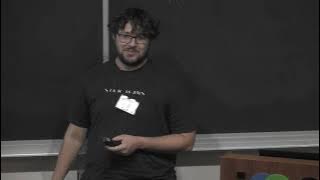
From playlist Week 1 2015 Shorts

Determine if Quantified Statements are True or False from a Table
This video provides several examples on how to determine if a quantified statement is true or false from a given truth table.
From playlist Mathematical Statements (Discrete Math)

Universal and Existential Quantifiers, ∀ "For All" and ∃ "There Exists"
Statements with "for all" and "there exist" in them are called quantified statements. "For all", written with the symbol ∀, is called the Universal Quantifier and and "There Exists" , written with the symbol ∃, is called the Existential Quantifier. A quantifier turns a predicate such as "x
From playlist Discrete Math (Full Course: Sets, Logic, Proofs, Probability, Graph Theory, etc)

Predicate and Quantifier Concept Check 1
This example provides a concept check for the understanding of quantifiers and quantified statements.
From playlist Mathematical Statements (Discrete Math)

5. Boolean variables in python
Boolean variables can be either True or False. These variables are very important in programming because we often have tasks or decisions to make which depend on whether different logical conditions are met. We need a way to define a True or False outcome. In this video we describe these v
From playlist Intro to Python Programming for Materials Engineers

Boolean Algebra: Sample Problems
In this video, I work through some sample problems relating to Boolean algebra. Specific, I work through examples of translating equivalences from logical or set notation to Boolean notation, and also a derivation using Boolean equivalences.
From playlist Discrete Mathematics

Learn about the three most basic types of values: booleans, strings, and numbers. A boolean is a true or false value. These words are special and reserved. You can't name a variable "true", because that word is already universal as a boolean (as is "false"). A string is a set of characte
From playlist Computer Science and Software Engineering Theory with Briana

Introduction to Predicates and Quantifiers
This lesson is an introduction to predicates and quantifiers.
From playlist Mathematical Statements (Discrete Math)

17. Space Complexity, PSPACE, Savitch's Theorem
MIT 18.404J Theory of Computation, Fall 2020 Instructor: Michael Sipser View the complete course: https://ocw.mit.edu/18-404JF20 YouTube Playlist: https://www.youtube.com/playlist?list=PLUl4u3cNGP60_JNv2MmK3wkOt9syvfQWY Quickly reviewed last lecture. Introduced space complexity. Defined S
From playlist MIT 18.404J Theory of Computation, Fall 2020

A Quick Overview of BOOLEAN ALGEBRA (symbols, truth tables, and laws)
Error in Video (9:32, 11:30): When talking about the last laws in the columns for equivalences, I say "DeMorgan's Law" when I mean to say "Distributive Law". In this video on #Logic, we learn the basics of #BooleanAlgebra and compare the notation for propositional logic with it. We cover
From playlist Logic in Philosophy and Mathematics

19. Games, Generalized Geography
MIT 18.404J Theory of Computation, Fall 2020 Instructor: Michael Sipser View the complete course: https://ocw.mit.edu/18-404JF20 YouTube Playlist: https://www.youtube.com/playlist?list=PLUl4u3cNGP60_JNv2MmK3wkOt9syvfQWY Quickly reviewed last lecture. Discussed a connection between games a
From playlist MIT 18.404J Theory of Computation, Fall 2020

Pascal Fontaine - SMT: quantifiers, and future prospects - IPAM at UCLA
Recorded 16 February 2023. Pascal Fontaine of the Université de Liège presents "SMT: quantifiers, and future prospects" at IPAM's Machine Assisted Proofs Workshop. Abstract: Satisfiability Modulo Theory (SMT) is a paradigm of automated reasoning to tackle problems related to formulas conta
From playlist 2023 Machine Assisted Proofs Workshop

For the latest information, please visit: http://www.wolfram.com Speaker: Adam Strzebonski Mathematica 10 introduces systemwide support for computation with mesh-based, discretized, and exact symbolically specified geometric regions. This talk focuses on symbolically specified regions, d
From playlist Wolfram Technology Conference 2014

Dmitriy Zhuk: Quantified constraint satisfaction problem: towards the classification of complexity
HYBRID EVENT Recorded during the meeting "19th International Conference on Relational and Algebraic Methods in Computer Science" the November 2, 2021 by the Centre International de Rencontres Mathématiques (Marseille, France) Filmmaker: Guillaume Hennenfent Find this video and other t
From playlist Virtual Conference

Haniel Barbosa - Better SMT proofs for certifying compliance and correctness - IPAM at UCLA
Recorded 14 February 2023. Haniel Barbosa of Universidade Federal de Minas Gerais in Belo Horizonte presents "Better SMT proofs for certifying compliance and correctness" at IPAM's Machine Assisted Proofs Workshop. Abstract: SMT solvers can be hard to trust, since it generally means assumi
From playlist 2023 Machine Assisted Proofs Workshop

Arnaud Durand : A quick and partial survey on the complexity of query answering
CONFERENCE Recording during the thematic meeting : « Discrete mathematics and logic: between mathematics and the computer science » the January 19, 2023 at the Centre International de Rencontres Mathématiques (Marseille, France) Filmmaker: Guillaume Hennenfent Find this video and other
From playlist Logic and Foundations

Getting the Most from Algebraic Solvers in Mathematica
This talk by Adam Strzebonski at the Wolfram Technology Conference 2011 gives a survey of Mathematica functions related to solving algebraic equations and inequalities. It also discusses the choice of the most appropriate solvers for various types of problems and the ways of formulating th
From playlist Wolfram Technology Conference 2011

Diffeomorphism Groups of Critical Regularity (Lecture 4) by Sang-hyun Kim
PROGRAM: PROBABILISTIC METHODS IN NEGATIVE CURVATURE ORGANIZERS: Riddhipratim Basu (ICTS - TIFR, India), Anish Ghosh (TIFR, Mumbai, India), Subhajit Goswami (TIFR, Mumbai, India) and Mahan M J (TIFR, Mumbai, India) DATE & TIME: 27 February 2023 to 10 March 2023 VENUE: Madhava Lecture Hall
From playlist PROBABILISTIC METHODS IN NEGATIVE CURVATURE - 2023

Using Boolean in Python (Python Tutorial #11)
Using Boolean in Python - let's go! This entire series in a playlist: https://goo.gl/eVauVX Also, keep in touch on Facebook: https://www.facebook.com/entercsdojo And Twitter: https://twitter.com/ykdojo
From playlist Python Tutorials for Absolute Beginners by CS Dojo

Oracle Separation of Quantum Polynomial time and the Polynomial Hierarchy - Avishay Tal
Computer Science/Discrete Mathematics Seminar I Topic: Oracle Separation of Quantum Polynomial time and the Polynomial Hierarchy Speaker: Avishay Tal Affiliation: University of California, Berkeley Date: Oct 1, 2018 For more video please visit http://video.ias.edu
From playlist Mathematics